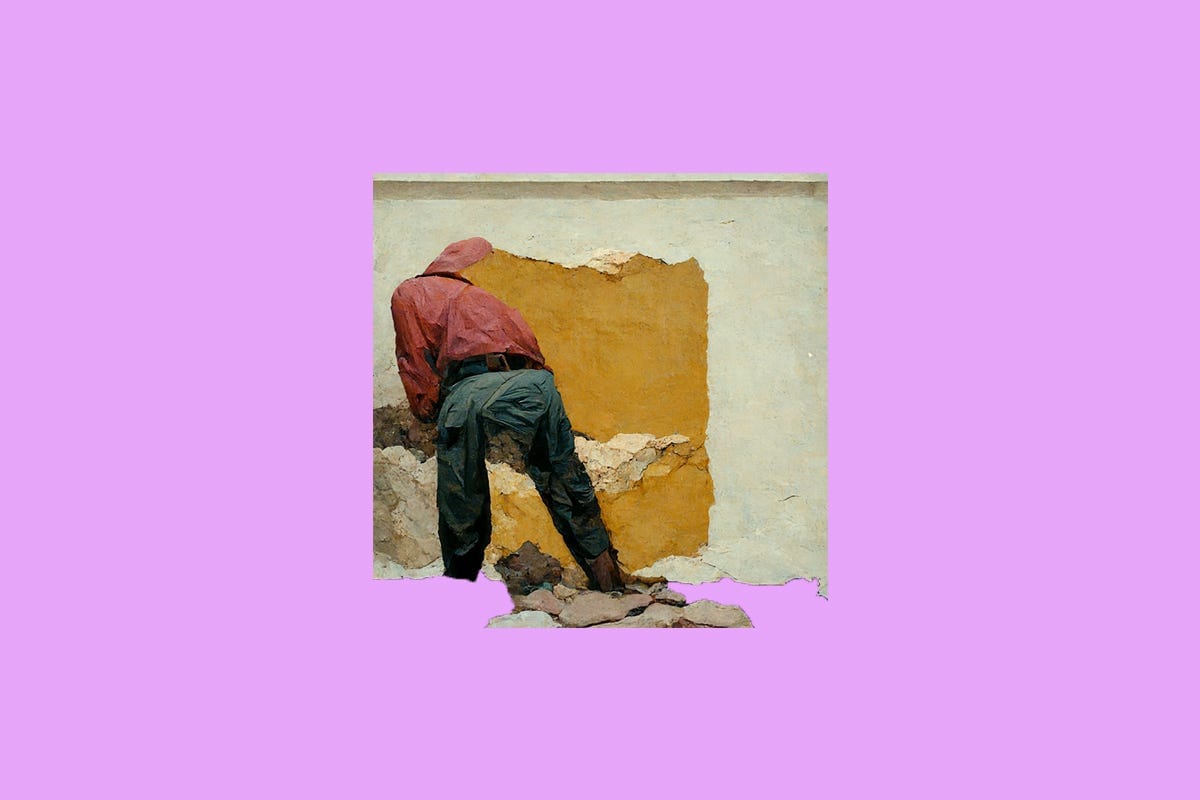What is postmodernism if not a Bondo-ing of the classical form?
A special investigation.

This is fine. Not fine in the way that the cartoon dog sits in the room, unconcerned that it’s engulfed in flames, but in the way that’s, you know, okay. Sure, allegedly building what appears to be a concrete kicker up to a mountainous A-Frame rail that’ll serve as the ender to your video part is a bit misleading. As is Bondo-ing the rumble strips in front of the subway tracks that all available evidence had led us to believe you’d gone over when you graced one of the best Thrasher covers of all time. But that doesn’t mean those tricks are suddenly easy or we were purposely misled.
Tyshawn Jones cleared the tracks in the same fashion and covered the same distance everyone else before him had—with either a sign over the rumble strips or at a time when the rumble strips didn’t exist. Nyjah Huston… well, if he did build that concrete kicker, that’s some unexplored territory in the realm of spot modification. Landing somewhere near Ryan-Decenzo-talking-shit-about-Deedz-using-a-kicker-to-a-handrail-in-an-Instagram-comment territory. However, grinding up and down an exceptionally large handrail as a single trick is still a serious feat, no matter how you get onto it.

If anything, all they’re doing is playing with form, a generally accepted practice and something people in most creative mediums are encouraged to do. What was postmodernism if not a Bondo-ing of the classical form? It served as a way for artists to reshape and reevaluate the world around them. When T-Pain worbles in his familiar auto-tuned fashion on “I’m Sprung,” is that not just an artificial kicker lifting his voice to a new and innovative plane?
It’s not as if Jones and Huston are creating new “street” spots wholesale, like one Steve Berra, whose spot-building exploits would be akin to AI-generated art. An awkward composite of obstacles, devoid of the joy of discovery and the satisfaction that comes from executing a trick on them. Jones and Huston are subverting our expectations of the details, not inventing them outright.
Richard Linklater’s A Scanner Darkly (2006), the sci-fi psychological drama starring Keanu Reeves, Winona Ryder, Woody Harrelson, and Robert Downey Jr., was animated using interpolated rotoscope. A technique that requires animators to trace over original film footage frame-by-frame to get a distinct and uncanny appearance. Covering a subject’s form to get it to look and function just the way you want it? Isn’t that what we do when we lacquer and wax a ledge or paint a curb?
Deknobbing or chopping the kink off of a handrail? Snipping branches off a tree or unkempt bush so your runup and landing are clear? Backing your pickup into a pole in an empty Safeway parking lot to create the perfect pole jam? Is that not simply collage? The adding to, subtracting from, or tweaking of a subject to change its context or intention in an effort to create one that’s wholly and fascinatingly new?
I mean, I dunno, maybe. It is fun to think about, though. Especially as these two skaters sprint toward SOTY. Does Jones’ kickflip mean less now that it’s a foot or so shorter than we expected? Does Huston’s questionable ramp neutralize any negative attention Jones’ kickflip might get, and vice versa, as we judge them both as potential Skaters of The Year? Is Louie Lopez’s bonkers trick on his latest Thrasher cover—that we’re sure to see the footage of soon—an example of found art since someone else cut out the crossbar at the bottom, opening the space he then uses to escape?

Eh, I might be thinking about this a little too much. Maybe we all are.





